Finding economic data on Passport
16/01/2025

One of the quickest and easiest ways to find global economic statistical data from a range of authoritative sources is to use Passport. Passport, a Euromonitor product, has both quarterly and annual historical data going back in some cases to 1977 and also provides several years’ worth of forecasts for some economic indicators e.g. GDP, inflation, population, foreign direct investment to name but a few. Information is obtained from national statistics offices, governmental and official sources.
For macroeconomic data:
- Click on the ‘Economies’ option on the Passport top menu bar.
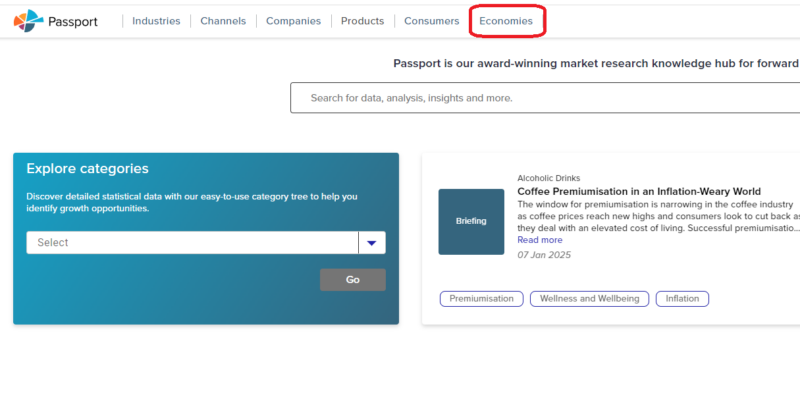
2. Then click on ‘Economy, Finance and Trade’.
3. In the ‘Explore Categories’ menu (highlighted below) select ‘Economies’ from the dropdown list and click on ‘GO’. This will take you to the Euromonitor ‘category tree’ where you can either search for or browse to the data you require.
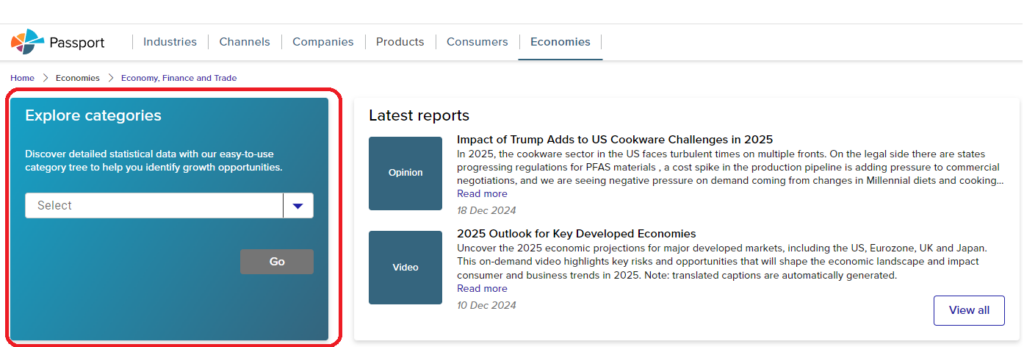
4. Within the Category Tree, you can drill down within data categories for more specific datasets. Click on the ‘+’ icon next to a category to explore subcategories. (These are definitely worth exploring). Drill down as far as you can before checking any boxes – this will ensure you get the level of data you require.
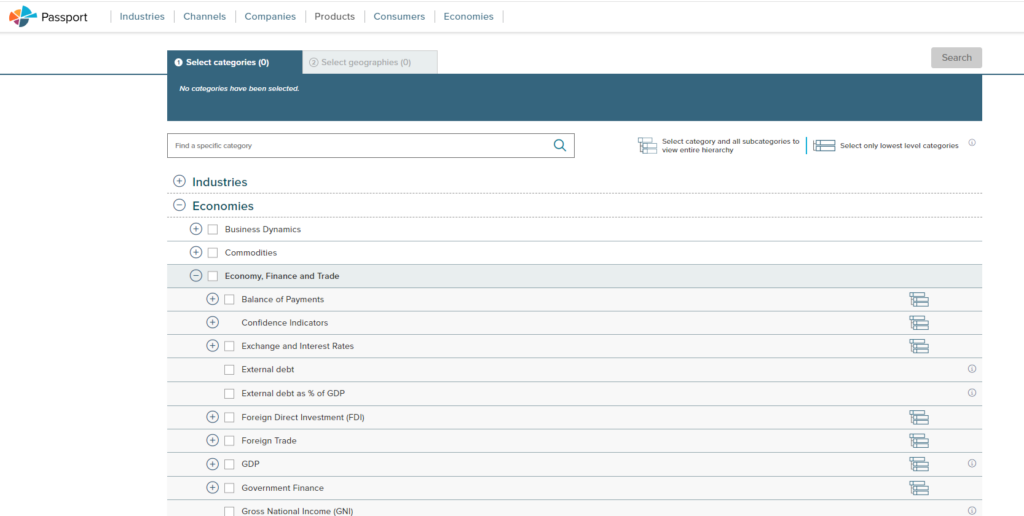
5. Select the category or categories you require using the check-boxes and click on ‘Next’ (at the bottom right) to move on to selecting your country or countries.
6. Select your countries in a similar fashion. You can choose from individual countries or select a pre-defined group, such as MINT, from the ‘Geographies’ dropdown menu on the right.
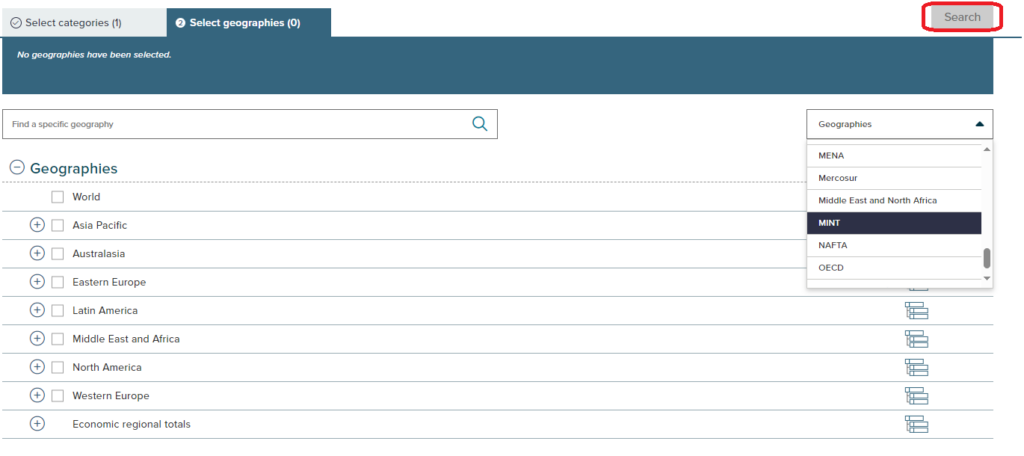
7. Once you have added all your countries, click on the grey/white ‘Search’ button (highlighted above – this turns white once you have made your selection) to run the search.
8. Passport displays results under three tabs. You will find data in the left-hand tab, under ‘Statistics’.
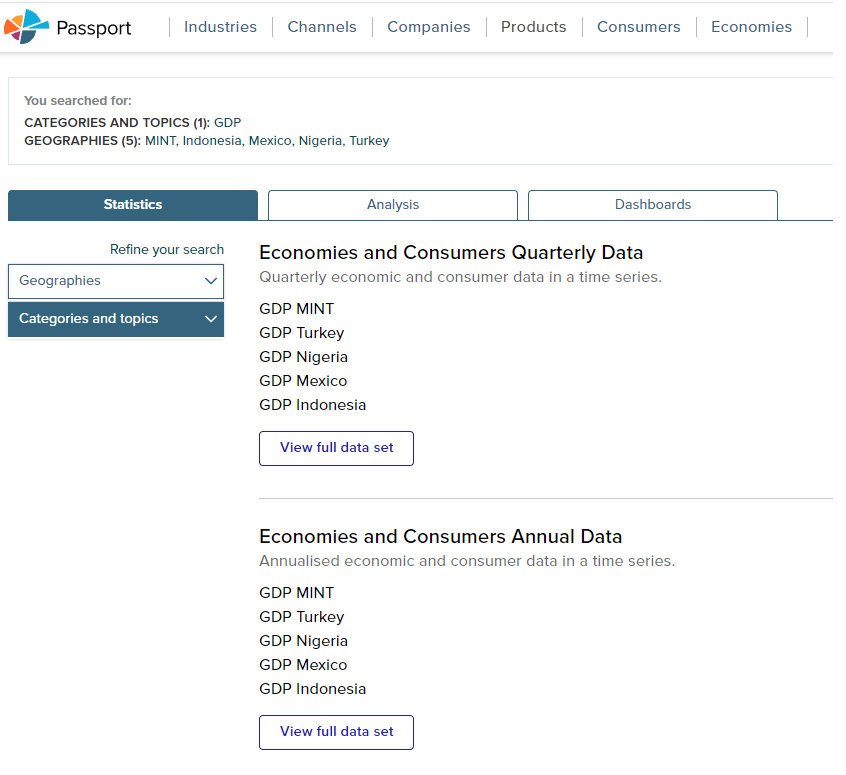
9. Click on any option to view an individual dataset – or on ‘View Full Data Set’.

Viewing data in Passport
- Use ‘Convert Data’ to select currency displayed and other options.
- Amend your date range using the dropdown menus.
- Use the download option to export to Excel or PDF.
Macroeconomic data is also easily accessible via BMI. Find out more here.
If you have any questions about data and where to find it, contact the Library for advice.
Feature image from Pixabay. Available at: https://pixabay.com/photos/earth-internet-globalisation-2254769/
Categories & Tags:
Leave a comment on this post:
You might also like…
From classroom to cockpit: What’s next after Cranfield
The Air Transport Management MSc isn’t just about learning theory — it’s about preparing for a career in the aviation industry. Adit shares his dream job, insights from classmates, and advice for prospective students. ...
Setting up a shared group folder in a reference manager
Many of our students are now busy working on their group projects. One easy way to share references amongst a group is to set up group folders in a reference manager like Mendeley or Zotero. ...
Company codes – CUSIP, SEDOL, ISIN…. What do they mean and how can you use them in our Library resources?
As you use our many finance resources, you will probably notice unique company identifiers which may be codes or symbols. It is worth spending some time getting to know what these are and which resources ...
Supporting careers in defence through specialist education
As a materials engineer by background, I have always been drawn to fields where technical expertise directly shapes real‑world outcomes. Few sectors exemplify this better than defence. Engineering careers in defence sit at the ...
What being a woman in STEM means to me
STEM is both a way of thinking and a practical toolkit. It sharpens reasoning and equips us to turn ideas into solutions with measurable impact. For me, STEM has never been only about acquiring ...
A woman’s experience in environmental science within defence
When I stepped into the gates of the Defence Academy it was the 30th September 2019. I did not know at the time that this would be the beginning of a long journey as ...






